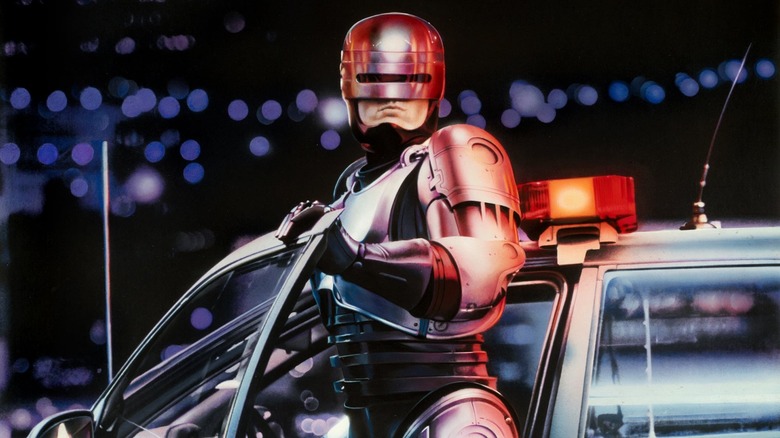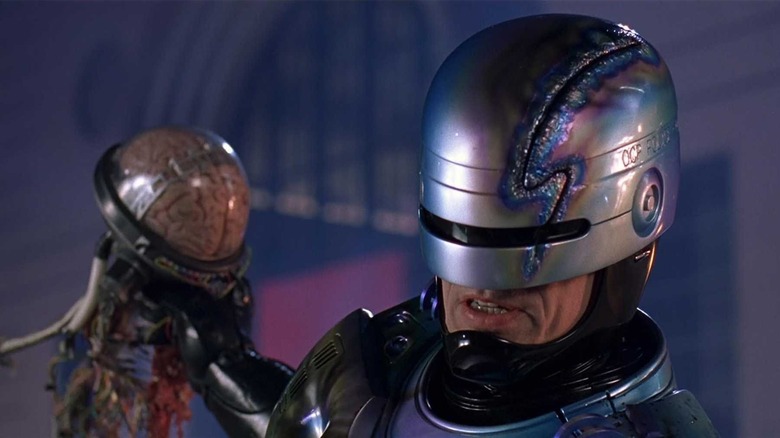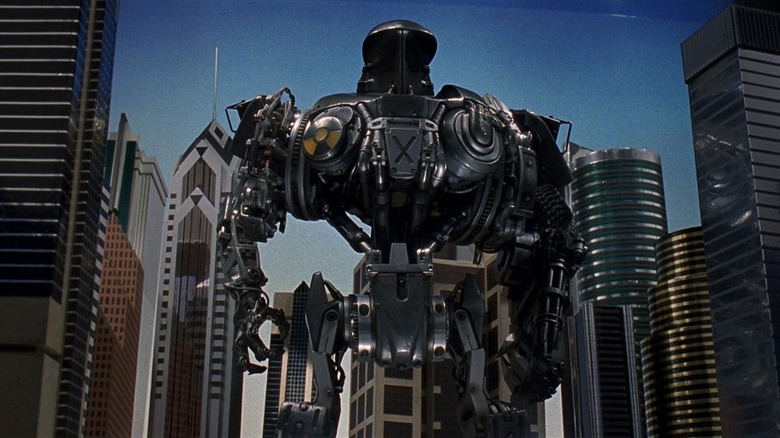The High-Concept RoboCop Sequel We'll Never Get To See
Paul Verhoeven's 1987 film "RoboCop" is the rare film to have feet firmly planted in both the realms of trashy schlock and brilliant cinematic masterpieces. Unabashedly violent, weird, and gory (the film initially received an X rating from the MPAA), "RoboCop" is one of the sharpest satires of Ronald Reagan's America that you will ever find. Verhoeven, with screenwriters Edward Neumeier and Michael Miner, left no dominant trends of the 1980s un-skewered: yuppie culture (Toadies! Cocaine!) insidious branding (NUKE'EM!), corporate greed run amok (OCP owns the cops!), governmental mishandling of crime (Send out military death robots!), and even the standard plot conventions of 1980s B-movies (have you seen how violent it is?). "RoboCop" functions as satire just as well as it functions as an enjoyably brutal grindhouse experience. Ken Russell called it the best sci-fi movie since "Metropolis," and it was put out by the venerable Criterion Collection.
"RoboCop" was also an enormous hit, and its bizarre infusion into the commercial world — what with its toys, video games, and two different Saturday morning cartoon shows — must have been the most delicious of ironies to the film's creators. In 1990, Irvin Kershner directed "RoboCop 2," based on an idea from famed comic book writer Frank Miller. Even gorier (a human brain is splattered with a robot fist), far sillier, and with satire perhaps a little less pointed, "RoboCop 2" is, regardless, still a pretty fun time at the movies. There followed a less well-received "RoboCop 3" in 1993, a live-action TV series in 1994, a miniseries in 2001, and a remake in 2014. This was in addition to the aforementioned two animated shows and five video games.
But back in 1990, when ideas for a potential "RoboCop 2" were still being pitched, screenwriter Edward Neumeier's vision was explicitly different from what was eventually produced.
The Distant Future
In a 2009 interview with Vice, Edward Neumeier talked about his original ideas for a "RoboCop 2," and how it was always meant to be, in his words, "more comic-book-y." In that interview, Neumeier semi-lamented that the original "RoboCop" didn't possess the big-budget slickness of some of its sci-fi film contemporaries. That was partly by design, as Neumeier and Miner wanted to depict a near future were everything is rundown instead of polished. The near future's landscape, he said, was going to look a lot like the present, just with the occasional RoboCop in the mix. "One of the advantages that "RoboCop" has over most of the futuristic films," Neumeier said, "is that it's not a very ambitious future." He pointed out that sci-fi films are usually too optimistic in their view of technological advancements, pointing out that there were flying cars in "Back to the Future Part II" which is set in 2015, a mere six years after he was being interviewed. It's 2022 now. How are those flying cars coming along?
As such, Neumeier's vision for "RoboCop 2" was going to use the first film's success to up the ante. His "RoboCop 2" was going to take a leap forward into the more distant future, with a RoboCop that was still alive and mentally communing with a human-like consciousness that existed somewhere within a city-wide internet-like communications network. It was going to be a female voice that RoboCop was going to fall in love with. This was a concept that Neumeier would eventually get to insert into the 1994 live-action "RoboCop" TV series, on which Neumeier served as showrunner, and whose script for "RoboCop 2" was to serve as the show's pilot.
The premise for the series — and the setup for "RoboCop 2" — was that Delta City, a project only under construction in the movies, was to finally be completed, with RoboCop, now paired with a new partner, serving as the law enforcement. RoboCop, however, has been slowly evolving, regaining tiny elements of his humanity despite being mostly machine. Don't forget, RoboCop was built out of the corpse of a fallen officer named Murphy (Peter Weller in the first two movies, Richard Eden in the series), and Murphy's widow was to appear in "RoboCop 2" and would be a semi-regular character throughout the show.
The disembodied consciousness that RoboCop communes with was the mind of a slain OCP executive named Diana Powers (Andrea Roth), whose brain was uploaded into an experimental network at her death. It's not long before RoboCop and Diana find one another in the cloud, giving RoboCop a perfect counterpart: They are now both mostly machine, he with a mechanical body, she with a computerized mind.
The Frank Miller Version
Because of a writers strike in 1988, and because Neumeier was working on a (sadly unproduced) screenplay for Oliver Stone, his version of "RoboCop 2" was not made as a feature. Frank Miller ended up writing the script for "RoboCop 2," after Neumeier recommended Miller write other projects for the studio. Neumeier's script was scrapped, and Miller was brought in to write. "RoboCop 2" was not as big a commercial or critical success as the first, but Neumeier feels that it's hard to beat what he, Miner, and Verhoeven did with the first. He did say in the Vice interview that the 1990 film was "very much fun."
Miller would also co-write the screenplay for "RoboCop 3" in 1993, with the film's director Fred Dekker ("The Monster Squad," "Night of the Creeps"). "RoboCop 3" was an attempt to make the series more family-friendly, which, in Neumeier's words, "defeats the entire purpose of 'RoboCop.'"
In 2009, Darren Aronofsky had a remake of "RoboCop" heading into production, but Neumeier had nothing to do with it. Although the 2009 remake from the director of "Requiem for a Dream" and "π" sounded promising, the project ended up getting scrapped. There were rumors that Aronofsky left because he refused to shoot in 3D like the studio wanted, but the shutdown came about for much simpler reasons: It turns out the financing just didn't come together. "RoboCop" was remade in 2014 as a PG-13-rated actioner directed by José Padilha, with Joel Kinneman as RoboCop. Neumeier didn't write that one either.
As is fashionable, however, "RoboCop" is in the pipeline for a timeline-ignoring, direct-follow-up-to-the-original sequel in the vein of the 2018 "Halloween," with Neumeier writing and producing. Neill Blomkamp was originally slated to direct, but he dropped out. Whether or not this film will actually be made remains to be seen. There is also a prequel TV series in the works about the rise to power of Dick Jones (Ronny Cox in the 1987 film).
It is here, perhaps, that we may now all appreciate that the franchising of "RoboCop" is ironic, yes?


